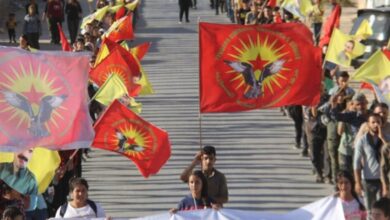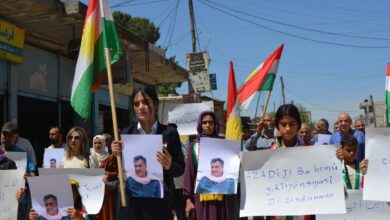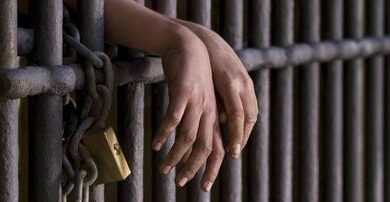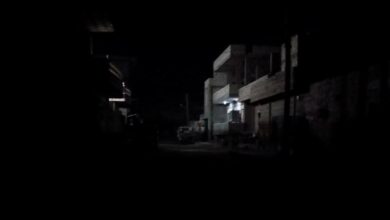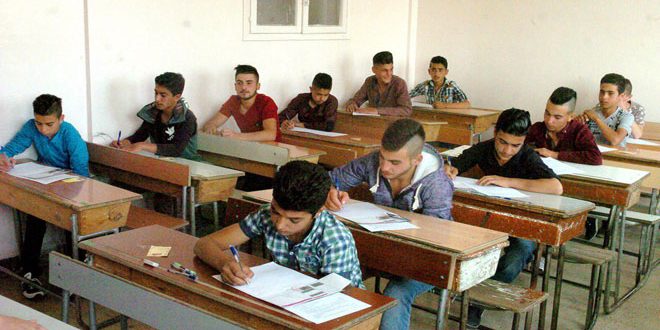
The Education crisis in the Kurdish regions “under the administration of the Democratic Union Party”
Yekiti_media
The Syrian crisis has cast a shadow over various aspects of life in Syrian Kurdistan, especially Education, which represents the biggest problem for most families, as access to Education for children in the region has become one of the biggest challenges of the conflict.
The priority of Education in the areas of the Autonomous Administration is the mother tongue and its imposition and the lack of recognition of the curricula imposed on students, which constitutes an obstacle for parents to send their children to schools, as the educational process faces an unknown future in the areas under the control of this administration in Syrian Kurdistan, where students face difficult conditions; Because there is no future for the certificates granted by this administration to the students, and the fate of these students is unknown after the curricula of the Autonomous Administration became a reality imposed on them and an obstacle in front of them to obtain the preparatory and secondary certificates.
This administration seeks to consolidate its position as a self-government for the people who live in this region, so it developed educational materials in the Kurdish, Arabic and Syriac languages, and established schools to teach these subjects in an attempt to diversify education options in the region, and despite the presence of thousands of students in their schools, education in their schools is illegal and undesirable It causes widespread controversy because there is no official recognition of it yet, as its curricula are recognized only by the universities that it opened within its region, such as the University of (Rojava University in Qamishlo, the University of Kobani in Kobani, the University of Alsharq in the city of Raqqa) and so on. These universities also do not include all specializations.
Families in the region find themselves confused about sending their children to Kurdish schools that are not recognized neither by the Syrian regime nor even by foreign countries operating in the country and their future is unknown. Kurdish families accept the fait accompli; Because it is less expensive in terms of means of transportation and expenses and also less expensive compared to sending her children to public schools in other cities and bearing the hardship of the road and the expenses to secure their future and obtain recognized certificates.
However, some of the people there say that the Autonomous Administration forcibly imposes its curricula on the students who live in the area, as it also carried out a policy of arrest to impose its curricula, and the internal security forces known as the Asayish arrested several times teachers who gave private lessons to the regime’s curricula; This is because some parents think that the schools of the regime are far away and expensive. Therefore, many were forced to open private courses for their children in order to freely apply for the preparatory and secondary certificates, but this administration once again became an obstacle for these students by closing their institutes and arresting teachers.
When students and parents protested against the Autonomous Administration’s decision to close institutes and private schools that adopt government curricula, the protesters were attacked by the Asayish, and that attack was a message from the PYD administration, in which they told the parents that they are not allowed to learn without their curricula in an area under their control. There is no other option but arrest.
The people in the region say that we are not against our language, on the contrary, we have no objection to teaching our children in their mother tongue, which we have been denied for decades, but the issue of international recognition of these curricula remains the biggest obstacle facing the educational process, and many local residents direct their criticism of the educational staff In self-administration schools that are not qualified and do not have educational experience; Because many teachers are not university graduates and highly qualified.
Students and the educational process must also be removed from political conflicts, such as forcing students and even teachers to participate in political activities affiliated with a particular party.
The people in the region are calling for allowing the students of the preparatory and secondary certificates to sit for the exams in their areas instead of traveling to the areas where there are government schools, noting that many young people did not take the secondary school exams for fear of being marketed to the army by the Syrian regime.
They also demand that parents separate politics from education and leave the choice to students and parents to choose the curriculum they want. They affirm that this policy of intimidation, such as arresting teachers, closing institutes and imposing their curricula, will not find any benefit in education. On the contrary, this increases students’ tendency to leave their schools. Although it is their mother tongue.
One of the parents says: We do not want our children to hate their language, because this method makes the student move away from his language and hate learning it.
Imposing these curricula in this way does not endear the student to his language. We love our language and we love to learn it and our children love it, but this is not the right way, and unfortunately it has a great role in strengthening the sense of alienation among students and parents, as one of the students’ families says: Our children are in Their path to an unknown future, and we are facing a generation whose educational future is lost between political conflicts and the imposition of unrecognized curricula. There is a generation without a recognized certificate and without sufficient education, and there are no solutions other than emigration from the region in search of a safe and good educational future for our children, away from the policy of coercion and intimidation.
Despite all attempts to make students love their schools, they collide with popular rejection, as residents and even officials and employees of the Autonomous Administration institutions refrain from sending their children to the administration’s schools. And that is for fear of their future, which was lost and wasted in the last years of the Syrian revolution, as many parents are trying hard to preserve the future of their children, whether by sending them to government schools in other regions, or the second option, which is immigration and the search for a safe future, and this leads to the end The end is a dangerous demographic change in Syrian Kurdistan.

